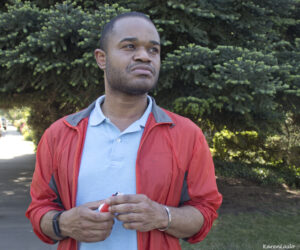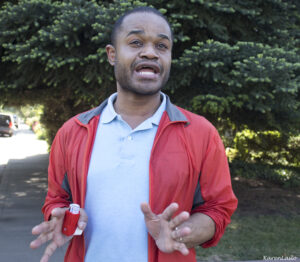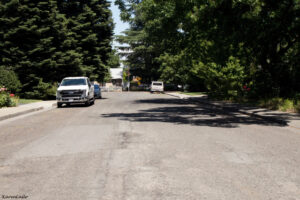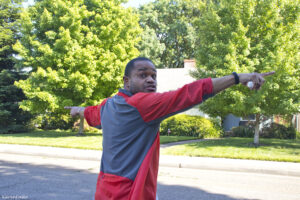by Leslie Layton
posted May 31
Steve Eaton is still troubled by what happened to him on the last day of March as he drove down an unmarked residential street in the part of old Chico known as The Avenues.

When he was pulled over by a Chico police officer, he remembers telling himself to stay calm and be polite. Surely whatever problem there was would be resolved quickly. But Eaton says his California driver’s license and an obliging attitude didn’t satisfy Officer Juan Valencia, who contended from the start that the 44-year-old African American man had been driving “erratically.”
Eaton was baffled, and told the officer, “It’s beginning to seem like you’re racially profiling me.” And from there the interaction went downhill — rapidly.
Eaton suffers from severe asthma and as the questioning went on, felt increasingly anxious. He asked for medical help as his heart raced and he became short of breath. By the end of the encounter he had collapsed to the ground shaking as he pumped his asthma inhaler and again asked for paramedics. One of two other officers who arrived at the scene called emergency medical services (EMS), Eaton said.

Eaton, who moved to Chico from the northeastern United States eight months ago, believes he was pulled over after Valencia spotted an African American man in the driver’s seat of his Mitsubishi Outlander van. But he’s more upset that Valencia refused to call for help when Eaton told him he had breathing difficulty and needed an ambulance.
“This is definitely about racial profiling,” Eaton said, “but more so, my vitals were at a critical level to the point where I collapsed. That’s not how we want to be policed.”
Chico Police Chief Billy Aldridge did not respond to either phone or email requests for comment on the incident, or on racial profiling in general. The City denied a public records request submitted by ChicoSol for the incident report and body camera video, citing sections of code that exempt many law enforcement records from disclosure requirements. Eaton provided his copy of the police report.
The City also denied Eaton’s request for the officer’s video, telling him the incident is the subject of an internal affairs investigation and the records would be available only by court subpoena.
A one-page report by EMS shows Eaton’s heart rate at up to 140 beats per minute and his blood pressure at a worrisome 174/96.
The police report, authored by Valencia, shows the officer pulled Eaton over at 7:37 p.m. “I advised Eaton I pulled him over due to him driving his vehicle towards the oncoming lane towards my vehicle on E. Sacramento Ave. although not clearly marked on the road separating the lanes.”

Eaton said he was out looking at neighborhoods — and driving cautiously because this one was residential — when the officer passed him, then made a U-turn and followed him as he turned left on Palm Avenue. The police report says Eaton slowed down to “well below 25 MPH …”.
After Eaton made the racial profiling comment, he said the officer sniffed at the open window. Valencia then said he smelled alcohol and ordered Eaton to take a field sobriety test. But by then, Eaton said, he was scared and unstable, and asked for a breathalyzer instead. That test showed there was .0% alcohol in his system.
“While instructing Eaton on the walk and turn he would not follow directions,” the police report states in relation to Valencia’s attempt to conduct a field sobriety test, “and claimed he was unable to breath (sic) and kept asking for a supervisor.”
Eaton said that when he asked for medical help, Valencia said, “I’m not calling EMS.”
“I said, ‘Please call EMS.’ I started praying and collapsed to the ground,’” Eaton said. “I could forgive all [Valencia’s] actions -– even though maybe I shouldn’t -– until he refused to call paramedics while I was on the ground pumping my asthma pump.”
Eaton said Valencia was soon joined by two more officers, Chris Sullivan and Nicolo DiStefano. One of the two suggested Eaton needed medical help and called paramedics, Eaton says.
Eaton wasn’t cited for any offense as a result of the encounter.
The police report provided by Eaton leaves blank the space where race should be entered. Chico police are required by state law to track the perceived race of everyone who is stopped.
RIPA requires race data reporting
California’s Racial Identity and Profiling Act (RIPA), passed in 2015, prohibits racial and other types of profiling and requires that law enforcement agencies collect “perceived” demographic data, including race, and report that data to the state’s Department of Justice (DOJ).
The Act was passed as part of an effort to get a handle on racial profiling in California driven by conscious or unconscious bias. When the Act passed, there was already a wealth of evidence that racial profiling was a problem affecting the relationships between communities of color and law enforcement agencies. But the organizations that sponsored the legislation wanted statistics that would show, in a concrete and undebatable fashion, what was happening and track any progress that is made.
One of the organizations at the table was the California Hawaii NAACP State Conference.
“Data rules the day,” said Rick Callender, president of the California Hawaii NAACP and a former two-term student body president at Chico State (1992-1994.) Callender helped conceptualize the RIPA legislation back in 2014. “If you have the data, you can see who’s stopped, who’s searched and who’s made to curb sit.”

The latest RIPA report, for the year 2021, shows that Latinx people were the largest percentage of some 3 million law enforcement stops in the state as a whole. African Americans were the most likely to be stopped because of “reasonable suspicion” they were engaged in criminal activity. Black youth were searched at nearly six times the rate of white youth, the report says.
Black individuals had the highest rate of being detained curbside or in a patrol car. Yet, Blacks stopped by law enforcement had the lowest proportion of traffic violations of the stops, and made up the greatest proportion of stops that concluded without any kind of charge or citation.
Chico Police Department referred ChicoSol to DOJ for 2022 RIPA data, which it said it began providing in January of this year. (The deadline for data delivery for small departments was April 1, 2023.)
The Chico State University Police Department submitted data for 2021 that gives a picture of who was stopped that year by that agency. Data posted online by DOJ shows that African Americans were believed by the officers to comprise almost 7 percent of the total number of their stops.
African Americans make up less than 3% of the student body at Chico State and the population of Chico.
Eaton: A case study
Eaton has spent most of his life in majority-white communities and calls the encounter with Valencia “really traumatic.”
“Nothing like this has happened before,” he said. “I’ve never been treated like this before, never.”

Eaton says his move to Chico -– due to an affiliation with Chico State University -– has proved more difficult because of the incident. “We all want to feel safe, and it depends so much on the actions of police.”
After checking his vital signs that night, paramedics offered to take Eaton to Enloe. Eaton declined and later went to the ER on his own.
He filed a complaint with the City and is awaiting a response.
RIPA says civilian complaints can serve as “an effective law enforcement accountability measure.” The Advisory Board says complaints can help prevent misconduct by turning up problems in policing practices early, and notes that racial profiling in particular can trigger “stress responses, depressive symptoms, anxiety …”
Eaton says he’d like two things: An apology and an effort to upgrade racial bias training. His encounter with Chico police, Eaton said, could be a “case study in how we can better police.”
Leslie Layton is editor of ChicoSol and a freelance journalist.

Thank you for this reporting. I see Steve walking in my NW Chico neighborhood routinely, and he always is friendly. I’m sad to hear how this story indicates that Chico ‘greets’ new residents of color with such suspicion and contempt by PD ranks. It will help if locals were to reach out with a smile and hello to these residents… and call for honoring record transparency requirements.
So troubling. Another example of a dysfunctional, dangerous CPD. Declining Public Records Requests by the Press is also disturbing. Where is the transparency? Will Mr. Eaton’s complaint be found to be “without merit?” Remember, the CPD police investigate fellow officers. Isn’t that a conflict of interest?
Thank you, Leslie, for your investigation and informative article that should reveal a racial profiling stop, but will the CPD own up to it?
Thank you for this article. We have work to do… Hope Mr Eaton contacts CC4J.org
Thank you Leslie for reporting this outrageous conduct by a Chico police officer. Police officers that do this in addition to the harm that they do to citizens, are also a danger to the safety of other police officers. I am not anti-police. I have known some excellent police officers. When a police officer abuses his or her authority and uses it to harm citizens, not only should that officer be immediately terminated, her or she should serve many years in prison. Life in prison when they injure or kill when the person being arrested wasn’t even violent.
While the majority of the people in Chico are moderate to liberal and while the majority vote Democratic for statewide partisan offices and presidential elections, Chico is a Republican town. I say this because Chico has a right-wing Republican city council. The city council was given to the Republicans on a silver platter by what was supposed to be the liberal city council of 2018-2020 opted to have district elections instead of at-large. Only 1 2 of the city council districts are majority progressive.
Howard County Maryland where I live has a police accountability board. While there are people in Columbia and Howard County, it’s not as severe like in Chico and Butte County and in the San Francisco area. I saw once someone in the street yelling at nobody in particular. We have large open spaces where people can walk and there are no homeless people. I don’t know all the details but I’m sure that more is being done to help people who are without homes, and more must be being done for people who are mentally ill. Here’s more on the Howard County police accountability board. https://www.howardcountymd.gov/News021522
I neglected to say that the reason why the homeless situation isn’t as bad in Columbia and Howard County Maryland as it is in Chico, isn’t just because the police shoo them away. It’s because more must be being done to get housing for people.
Thank you Leslie for this article. Thank you also to Mr Steve Eaton for sharing his story around the reality of racial profiling in Butte County. The stress response Mr Eaton had during the incident and the officer’s callous response demonstrates the immediate need for more implicit bias training foe CPD and increased community participation in police accountability and oversight.
This story about how a Chico Police Department Officer treated Steve Eaton is leaves me outraged about the lack of humanity, dangerous lack of common sense, and refusal to get medical help to a man who was begging for it. Did the officer consider the fact that an asthma attack can be fatal, if not appropriately treated? Does CPD really want another civilian death on its record?
Since 2015, at least 4 out of 11 law enforcement involved fatal shootings in Butte County have been people of color, out of proportion to their numbers in our county. This incident could have easily spiraled down into another one of those. As it was, the trauma had a devastating effect…….it harmed a man who did nothing to deserve it. Is the officer charged? Of course not. He’s above the law, right?
The involved officer didn’t cite Mr. Eaton for any offense. Did he think that he didn’t have to cite him, that being an African American man was an offense in itself, especially when this particular black man spoke his truth, pointing out that the officer seemed to be racially profiling him. The officer also left blank Mr. Eaton’s race, a clear violation of State law…… and convenient for the officer if he didn’t want to be charged with racial profiling.
This incident needs to be investigated by independent investigators……..like a citizen run police accountability commission, which so far Chico PD has refused to support……officers investigate their own.
As an older white woman, there’s no way I can know what it feels like to be racially profiled, but I can say, “NOT IN MY NAME” ….. this is not how anyone should be treated. The incident is a blot on Chico PD, and members of the community await the outcome.
Steve Eaton committed no crime but ended up instead experiencing a lack of compassion from Officer Valencia when his asthma flared up in a stressful encounter with a “peace officer”. This officer must get more training in implicit bias and general empathy. First he racially profiles Mr. Eaton and then he doesn’t call for medical support for him.
Really, he didn’t consider a black man in America would experience extreme stress when a police officer pulled him over?!
Thank you to the officers Sullivan and Distefano who did call the paramedics to assist Mr. Eaton.
As Ann Polivka mentions in her comment, “The officer also left blank Mr. Eaton’s race, a clear violation of State law…… and convenient for the officer if he didn’t want to be charged with racial profiling.” How many other incidents have there been in Chico? This shows Chico PD continues to need to increase training in implicit bias.
I’m sorry Mr. Eaton had this troubling experience. I’d like to say “welcome to Chico”. It really is a great place to live. I will take responsibility for not pressing harder for a citizens advisory board to help with CPD’s community relation’s problems. We can do better.